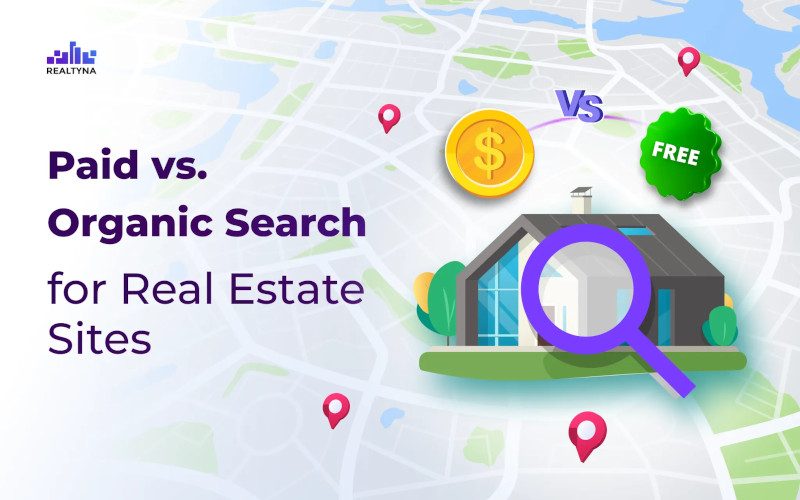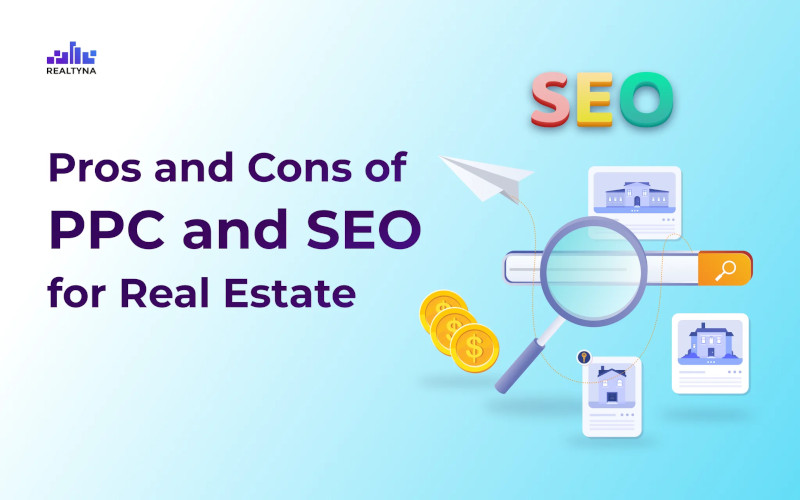You are viewing our site as an Agent, Switch Your View:
Agent | Broker Reset Filters to Default Back to ListPaid vs. Organic Search for Real Estate Sites
March 17 2024
 You've spent weeks optimizing your real estate website and creating helpful content, but you're still not ranking on page one of Google for those competitive keywords. Don't worry, it's not your fault. Ranking organically on Google for real estate terms can take months or even years of work. If you want to start generating more leads and traffic right away, paid search is the way to go.
You've spent weeks optimizing your real estate website and creating helpful content, but you're still not ranking on page one of Google for those competitive keywords. Don't worry, it's not your fault. Ranking organically on Google for real estate terms can take months or even years of work. If you want to start generating more leads and traffic right away, paid search is the way to go.
Paid search, also known as pay-per-click or PPC, allows you to pay to have your website or ad rank higher in search results. You only pay when someone clicks your ad. Organic search, on the other hand, relies solely on Google's algorithm to determine your rank. The good news is you don't have to choose one or the other. Using paid and organic search together is the most effective strategy for real estate websites.
Paid Search, What is it?
Paid search, also known as pay-per-click (PPC) advertising, is a way for businesses to promote their websites by bidding on keywords related to their products or services. When someone searches for those keywords, your ad may appear at the top of the search results page. You only pay when someone clicks your ad.
For real estate sites, paid search ads can be an effective way to drive traffic and generate leads. You choose keywords like "homes for sale," "real estate agent," or "[location name] real estate" that people in your target market may search for. When prospective clients search for those terms, your ad pops up. If the ad catches their eye and they click it, they'll land on your website.
-
Pay only for clicks: You set a maximum cost-per-click (CPC) bid for your keywords. If your ad ranks high enough to show, you'll pay the minimum amount needed to maintain that position, up to your maximum bid. You're only charged when someone clicks your ad. Check out most important real estate keywords now.
-
Reach people actively searching: Paid search targets people who are actively searching for information related to your business. They're already interested, so they may be more receptive to your message.
-
Measure results: Paid search provides detailed reporting to help measure the performance and ROI of your campaigns. See which keywords are most effective, how many clicks and impressions your ads are getting, and how much traffic is being driven to your site. Tweak as needed to improve results.
-
Requires ongoing management: Paid search campaigns require regular monitoring and optimization to achieve the best results. You'll need to keep tabs on your budget, bids, ad copy, and keyword performance. As search trends change, you'll want to make adjustments to your strategy.
Paid search can be an integral part of a real estate website's marketing plan. When leveraged effectively, it helps generate high-quality leads and builds brand visibility. However, to achieve success, paid search campaigns require time, money, and consistent optimization.
Organic Search, What is it?
Organic search, also known as natural search, refers to the unpaid results that show up on search engine results pages (SERPs) based on the relevancy to a user's search query. For real estate websites, ranking high in organic search results is crucial to generating traffic and leads.
How Organic Search Works
Search engines use algorithms and bots to crawl the web and index websites and their content. As people search, the algorithm determines which sites and pages are most relevant based on the search query and ranks them accordingly. The sites and pages that rank the highest, like on the first page of Google's search results, get the most visibility and traffic.
For real estate sites, ranking well in organic search usually comes down to two main factors: on-page SEO and off-page SEO. On-page SEO refers to optimizing your own website content for search engines, including page titles, content, URL structure, meta descriptions, image alt text, and internal linking. Off-page SEO refers to building quality backlinks to your site from other authoritative domains.
More backlinks and higher quality content both signal to search engines like Google that your site is an authority on the topics and keywords you're targeting. The higher your authority, the higher you can rank in organic search results. Optimizing for voice search has also become increasingly important. Many people now search for "homes for sale near me" or "apartments for rent in [city name]." Make sure your site content also targets these types of local and voice searches.
For real estate agents and brokers, a higher position in organic search results means more visibility to potential clients. According to studies, the top three organic search results get the vast majority of clicks for any given search. If you can rank on page one, especially in positions one through three, you'll be in a great position to generate new leads and clients through organic search traffic.
Continually optimizing your on-page and off-page SEO, publishing new content, earning high-quality backlinks, and providing the best user experience are the keys to climbing the ranks in organic search. While it does take work, the rewards of first-page rankings and a steady stream of organic traffic and new clients can be well worth the effort.
Learn more about real estate SEO at our complete guide on it.
Pros and Cons of Each Approach for Real Estate

When it comes to driving traffic to your real estate website, you have two main options: paid search or organic search. Both have their pros and cons, so you need to determine which approach aligns best with your business goals and budget.
Paid Search (Pay-Per-Click or PPC)
With pay-per-click (PPC) advertising, you pay to have your website appear at the top of search engine results pages (SERPs) when people search for keywords related to your business. Platforms like Google Ads and Bing Ads allow you to target potential clients based on location, intent, and interests.
Pros
- Quick results. PPC ads can drive traffic and leads almost immediately.
- Targeted. You can focus your ads on people actively searching for real estate or properties like yours.
- Measurable. PPC provides detailed reports on impressions, clicks, conversions, and costs so you know what's working.
Cons
- Expensive. PPC ads can cost $1 to $50 per click depending on the keyword, and costs add up quickly.
- Requires ongoing optimization. PPC campaigns need constant monitoring and tweaking to maximize results and limit wasted spend
Organic Search (SEO)
With search engine optimization (SEO), you aim to rank highly in the unpaid, organic results on SERPs. By optimizing your website content, technical elements, and backlinks, you can improve your visibility in search engines like Google and Bing over time.
Pros
- Free. Organic search is free once you've optimized your real estate website.
- Long-term results. SEO can drive sustainable traffic and leads for months and years to come.
- Credibility. Ranking organically builds trust and authority in the eyes of searchers.
Cons
- Slow results. It can take 3-12 months of ongoing work to start seeing significant improvements in organic rankings and traffic.
- Constant work required. SEO is an ongoing process that needs continuous monitoring and updates to avoid losing ground.
- Unpredictable. Organic rankings can fluctuate due to algorithm changes and new competitor websites.
For most real estate businesses, a combination of paid and organic search strategies works best. PPC can drive short-term results while you work on long-term SEO, and SEO helps reduce your reliance on paid ads over time. The key is finding the right balance based on your priorities.
Key Takeaways: When to Use Paid vs. Organic Search
When it comes to optimizing your real estate website, you'll need to determine the right mix of paid and organic search. Both have their pros and cons, so consider your goals and budget to find the optimal balance.
Organic Search (SEO)
Organic search, or search engine optimization (SEO), focuses on improving your ranking in the unpaid search results on Google and other engines. The main benefits of organic search are:
- It's free. You don't have to pay for clicks or impressions.
- It builds long-term value. Good SEO will continue to drive traffic to your site over time.
- It improves brand visibility. Ranking highly in organic search helps establish your authority and credibility.
However, SEO also has some downsides:
- It can take time to see results. It may be 6-18 months before you achieve top rankings for competitive keywords.
- Google algorithm changes can impact your traffic. If Google tweaks its algorithm, your rankings and traffic could drop significantly.
- You're dependent on the search engines. You have no control over where they rank your site.
Paid Search (PPC)
With pay-per-click (PPC) advertising, you bid on keywords and pay each time someone clicks your ad. The main benefits of PPC include:
- Fast results. You can launch a PPC campaign and start getting traffic within a day.
- More control. You have more control over where your ads appear and can adjust bids and budgets as needed.
- Targeting options. PPC allows you to target specific keywords, locations, devices, and more.
However, there are some downsides to PPC:
- It can be expensive. Fees for competitive keywords and locations can cost $30-$50 per click or more.
- Traffic stops when you stop paying. As soon as you pause or cancel your PPC campaign, your traffic will drop to zero.
- Click fraud is possible. Some clicks on your ads may be invalid, costing you money.
In summary, for most real estate websites a combination of paid and organic search works well. Use SEO to build up long-term traffic and authority, while employing PPC to drive immediate results and fill in gaps. Find the right balance for your needs and budget.
Conclusion
So there you have it. Organic and paid search both have an important role to play in driving traffic to your real estate website. Focusing exclusively on one or the other means leaving opportunity and money on the table.
The key is finding the right balance between SEO and PPC to maximize your visibility and leads. organic search may take longer to gain traction but leads tend to convert at a higher rate. Paid search delivers immediate results but at a cost and conversion rates may be lower. By investing in both, you're covering all your bases. You'll drive more traffic, generate more leads, and ultimately close more deals.
The world of online marketing can seem overwhelming but keeping it simple and focusing on what works for your business is the smartest strategy. Check out our other most readable article titled: Cracking the Code: A Guide to Real Estate Marketing Terms.
To view the original article, visit the Realtyna blog.









